|
|
Press Release:
NASeA Silver Jubilee Day 2016 Concludes Successfully
Happy Dashain – Tihar 2016 Greetings from NASeA!
On the occasion of Nepali Dashain-Tihar B.S. 2073, Nepalese Association in Southeast America (NASeA) successfully held her Silver Jubilee 2016(नासा रजत महोत्सव वर्ष २०१ ६) celebration; wrapping up the day with celebratory Cultural/Concert in the magnificent city of NASeA’s regional capital Atlanta, Georgia on Saturday, October 8, 2016.
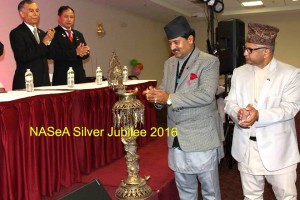
NASeA was established on the auspicious occasion of Happy Bijaya Dashami 1991 in Atlanta, Georgia. She proudly completes her twenty five years of journey with a lot of accomplishments and has a glorious history. NASeA Silver Jubilee 2016 official ceremony was chaired by President Bimal Nepal. The opening ceremony commenced with the lighting up of DIYO in Panas by the
chief guest Excellency Honorary Consulate General Prem Raja Mahat. Both American and Nepali national anthems were played during this occasion. Expressing his remarks the Chief Guest Mahat proudly claimed that NASeA being the role model to other organizations in the United States of America. On behalf of Nepal Government and Consul General Office, he congratulated NASeA on this special occasion of Silver Jubilee celebration. 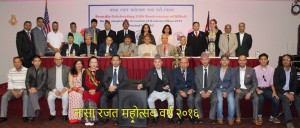 NAG, the host organization President Damu Dangol welcomed all participants, congratulated NASeA family and expressed his best wishes for NASeA Silver Jubilee. NASeA EVP and the Silver Jubilee organizing Committee Co-Chair Shailendra Bajracharya welcoming the guest outlined entire events of the day.
President Bimal Nepal welcomed all distinguished guests and respected participants and took the moment with pride to read out the keynote address message sent by the Founding President Dr. Bishwa Acharya. Please find the attached copy of the Founding President Dr. Acharya message with this Press Release.
On a separate note, President Nepal Saluted all NASeA Founders, Former Presidents, All current and past officers, Life Members, General Members, State Organizations Presidents/Officers, Community leaders and well wishers for their outstanding and unconditional support extended towards NASeA for the past 25 years and he reinforced his commitment to cherish NASeA for another 25 years and more to come.
Furthermore, he informed that the Silver Jubilee celebration will be continued till NASeA-ANMA joint convention 2017 in Charlotte, NC; marked with Special recognition of “NASeA Heroes” together with NASeA Silver Jubilee publication special edition “NASeA SMARIKA” NASeA will organize Blood Donation with her partner organizations in all the states of this region together with other activities throughout the year. Stating that NASeA Life Member is our Life Time Pride, he said that the discounted rate for NASeA Life member will be extended till the joint convention 2017 to encourage everyone to be NASeA Life Member.
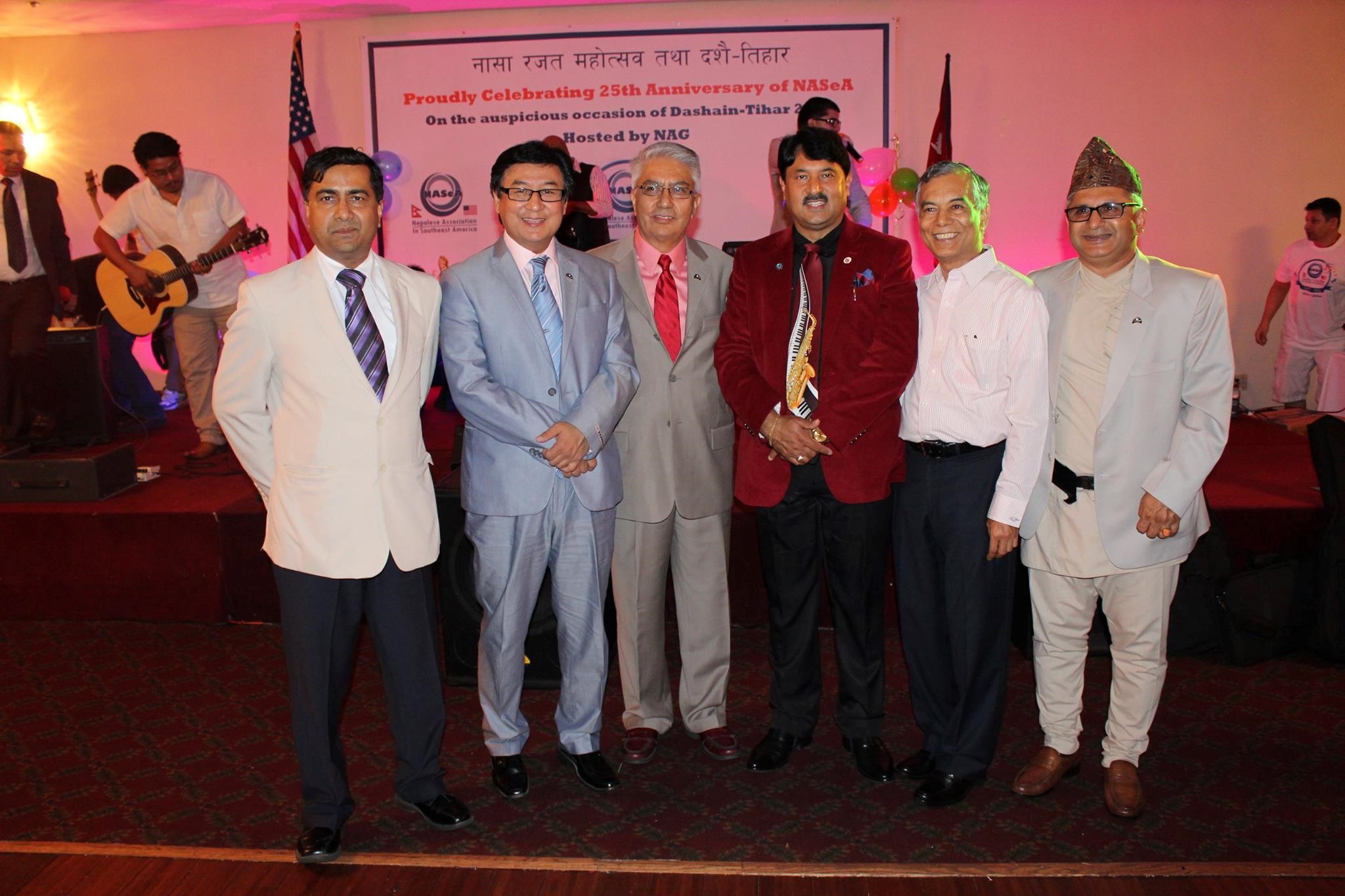 Addressing the ceremony, NASeA Former President Dr. Ramesh N. Amatya congratulated each and everyone and advised all to work together to recognize NASeA globally. Other Former Presidents Shaubhagya L Shrestha, Raja Ghale and Dr. Sanjeeb Sapkota also addressed the opening ceremony and shared their experiences and expertise and extended best wishes to NASeA. On behalf of the current Executive committee members, President Nepal honored all the respected Former Presidents with a special plaque for their outstanding contribution towards leading NASeA and serving Nepali American community and Friends of Nepal in preserving and promoting our culture, identity during their respective tenure.
The written congratulatory and best wishes message (attached) sent by the Rt. Honorable Prime Minister of Nepal Puspa Kamal Dahal “Prachanda” was read out by General Secretary Shiva Bista. On behalf of their respective organizations, Special Guests Dr. Prahlad Pant (Former President-ANMA and President-NCC), Mr. Gobinda Shrestha (Director-NRN-NCC of USA), Mr. Chet Nath Ghimire (President INLS, Georgia Chapter), Mr. Satish Gupta (President SCAN), Mr. Dilip Dahal (Vice Chairman of Bhutanese Community) all extended best wishes to NASeA. The special guest and renowned TV journalist of Nepal Prem Baniya also addressed the session and expressed his willingness to move together with NASeA to do some good things for Nepal. During this event, NASeA honored Chief Guest Honorary Consul General Prem Raja Mahat for his exceptional contribution to preserve our native culture and tradition. Host organization NAG President Damu Dongol and TV Journalist Prem Baniya were also honored for their contribution. 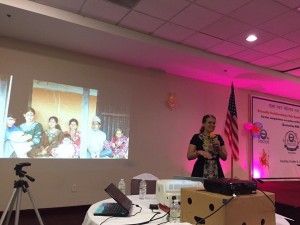 During the business hour, Ms Natasha Wozniak presented the Rainaskot , Lamjung Reconstruction Project trying to rebuild the badly affected area by the Mega Earthquake. NASeA and ANMA has been supporting her project with the donation of 10 K dollars . Community building named as ” NASeA” and “ANMA” House is being constructed in this village. This event was moderated by EVP Shailendra Bajracharya, and he was able to energize the participants to raise more than $1100.00 dollars within 30 minutes, right after Natsha’s presentation. This fundraiser continued during cultural show led together by Treasurer Pashupati Neupane and Adviser Mohan Bista. President Bimal Nepal expressed the best wishes for Lamjung project and reinforced NASeA’s commitment to match the committed fund to build NASeA-ANMA house within coming Loshar celebration. He directed IT Chair Manish Shakya to create Donation tab “NASeA Fund for Lamjung” on the website. NASeA generously supported $1002.00 to HIMPAT victims to Sindhupalshok village during the extreme cold weather in Nepal this year was a perfect example of NASeA helping the country of origin Nepal. This project was led by Treasurer Neupane.
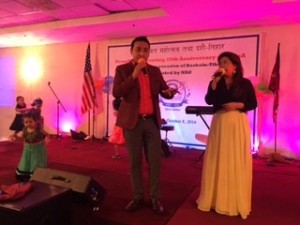
Cultural and concert capped the day with fun filled performances. Local talents Oskar Sharma, Rujala Shrestha and Sanjana Shrestha Dance, Dr. Sanjeeb Sapkota, Bhuwan Khanal, Kailash Kayastha, Sudha Amatya and local band 4 M spellbound the audience.
Musical event performed by young artist Lokesh Gurung followed by folk duet renowned singers Suman Budha Magar and Sangita Thapa Magar were the pivotal attraction. The musical event was able to entertain all demographic background including the senior local leaders. ANMA VP Kailesh Kayastha extended best wishes to NASeA Silver Jubilee and performed his two melodious songs. Cultural/Concert event was coordinated by VP of NASeA Tara Pun.
During the cultural event, NAG also recognized all founding members with the special plaques in the presence of Chief Guest Mahat and NASeA President Bimal Nepal. On behalf of Atlanta Nepali School, the president of NCC, Atlanta Dr. Prahlad Pant and NAG President Damu Dangol along with dedicated volunteer teachers Sabita Shrestha, Ichchha Bastola, Mrs Sujata Dongol. President Dongol presented the School activities. Dr. Pant also requested everyone to contribute for the Atlanta Nepali School. NASeA proudly recalls that Atlanta Nepali School was officially handover by NASeA to NCC a 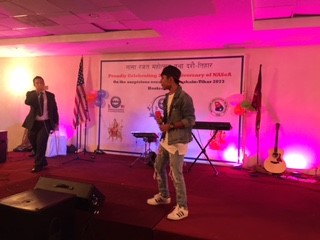 few months back. Highlight of the event was the special NASeA Silver Jubilee 2016 Birthday Cake cutting ceremony which was jointly cut by the Chief guest Prem Raja Mahat, Former President Dr. Ramesh N. Amatya and the current President Bimal Nepal. Prior to cake cutting ceremony, President Nepal once again honored all NASeA Founders, Former Presidents/Officers, Life Members and wishers and together promised to keep the NASeA torch alive in best serving the community as guided by her By-Laws. A complete one day event of this celebration was organized in well decorated ba 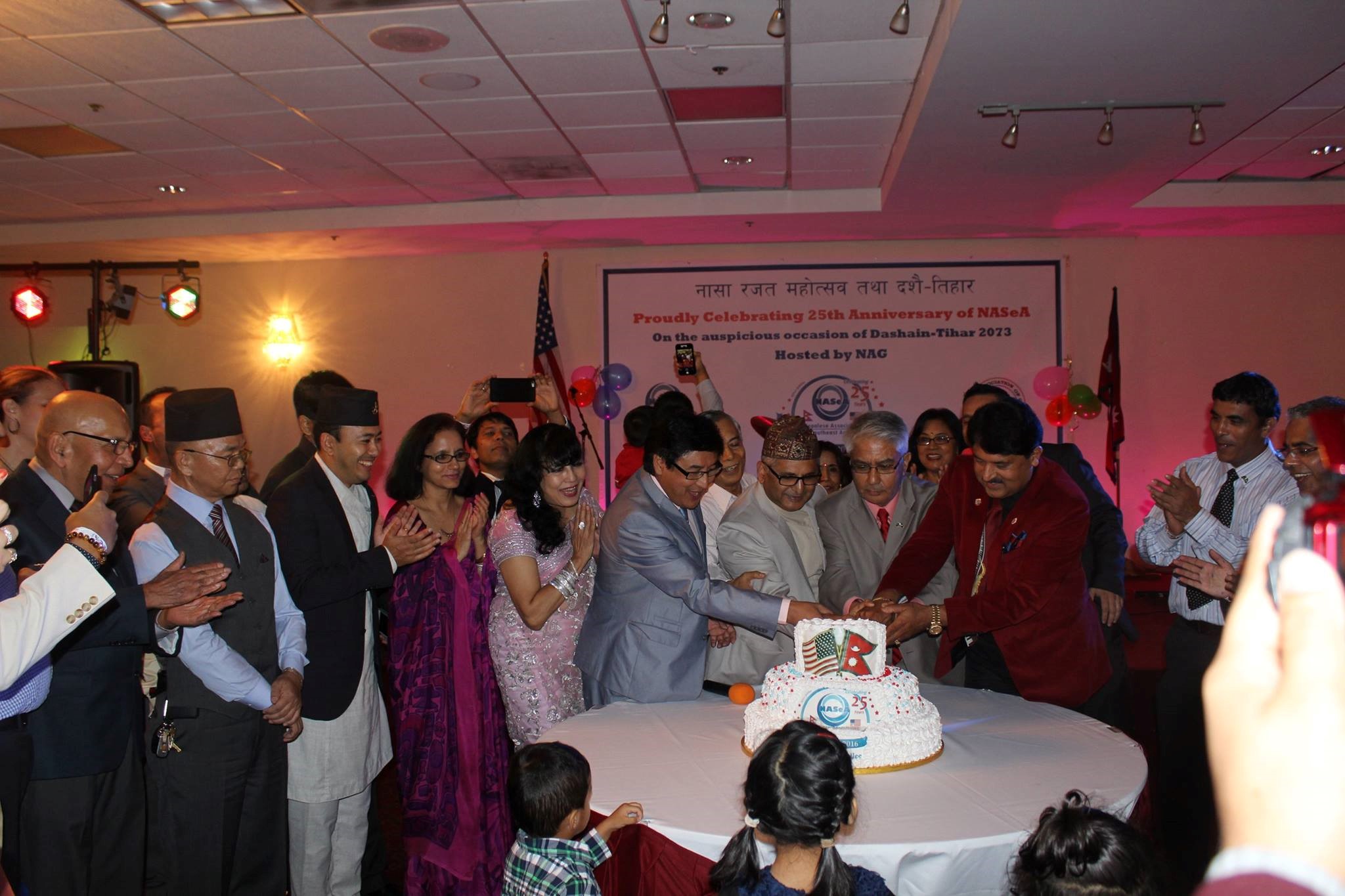 nquet hall inside Global Mall at the heart of beautiful city of Norcross in Georgia. Board members Bidya Gurung and Namita Ghimire led the decoration of the venue.
Registration desk was well managed by NASeA Treasurer Pashupati Neapupane, NAG Treasurer Baburam ji Kumar KC. NASeA Board members Sushil Nepal, Manish Shakaya, and Satish Gupta very effectively managed the booth where special T-Shirt with NASeA Silver Jubilee logo was sold. Board Members Gajendra Aryal, Girwan Pandey, Yogeshwar Karki, Narendra Baral together with NASeA Adviser CK Parajuli, Kumar KC, Gobinda Shrestha, Amreeta Regmi, Mohan Bista were physically present and extended their valuable contribution towards making this convention a success.
Self-pay Lunch was offered in Asiana restaurant in Global Mall and for all registered participants a delicious Snacks/Dinner was served during the cultural/concert night.
The opening ceremony and business hours was conducted jointly by Shiva Bista and Krishna Shrestha the General Secretary and Joint Secretary respectively. While the Cultural/Concert event was Emceed by NASeA Executive Member Bhuwan Khanal.
NASeA Silver Jubilee Day Celebration concluded with a Grand Success and together we will celebrate this with various activities till Dashain 2017.

नासा रजत महोत्सव वर्ष २०१६
NASeA Silver Jubilee Celebrations, October 8, 2016 in Atlanta, GA
Respected Nepali Organizations Presidents, Community leaders, Professionals, Media Personnel and well wishers,
May Goddess Durga Bhawani Bless us all!
On behalf of Nepalese Association in Southeast America (NASeA), I take this pleasure to welcome you all to “NASeA Silver Jubilee 2016” (नासा रजत महोत्सव वर्ष २०१६) in the magnificent city of Atlanta, Georgia on Saturday, October 8, 2016.
With due respect, I would like to request you to kindly lock this date October 8, 2016 where we will celebrate one-day long NASeA Silver Jubilee event with various activities including grand NASeA Dashain-Tihar party 2016 and the Cultural-Concert show.
Highlights of the event (see attached for DRAFT Program Details):
A: Inauguration/ Welcome and Business Hours: 10 AM – 4 PM
B: Cultural/Dashain-Tihar event/Concert Program: 6 PM – Midnight
NASeA together with our host organisation NAG and all our partner organizations of this region would like to celebrate and cherish our twenty five years of establishment and together set her goals for another decade.
NASeA would like to welcome our Life Members, General Members, Officers, Advisers, Former Presidents and all Presidents/Community leaders and well wishers in the US and around the world to celebrate our Silver Jubilee 2016 in a grand manner. We will definitely be a catalyst to support Nepali American Community here in US and our country of origin Nepal in all fronts.
Always with the Nepali American Community and Friends of Nepal.
With Respect,
Bimal Nepal
President and Executive Members
Nepalese Association in Southeast America (NASeA)
https://www.facebook.com/Nasea-America-1587069598248750/
Related Info:
Please use the following link to book hotel at Hampton Inn. This hotel is located next to Global Mall, where NASeA Silver Jubilee is taking place. (Just a few feet walk from Hotel to Global Mall entrance. No need to drive)
$89 / Per Room night
Booking Link: https://secure3.hilton.com/en_US/hp/reservation/book.htm?ctyhocn=ATLNXHX&corporateCode=0003105300&from=lnrlink
Hotel: Hampton Inn Norcross
Company Name: Global Mall
This is the best price I was able to get using Global Mall discount. You may want to also look nearby hotel for better deal.
Global Mall is located at 5675 Jimmy Carter Blvd, Norcross, GA 30071
Hampton Inn is located at 5655 Jimmy Carter Blvd, Norcross, GA 30071
Please contact me if you have further question
evp@NaseaOnline.org
Thank you
Shailendra Bajracharya
Executive Vice President, NASeA
12th Annual ANMA/NASeA Joint Convention, 2016 Concludes Successfully
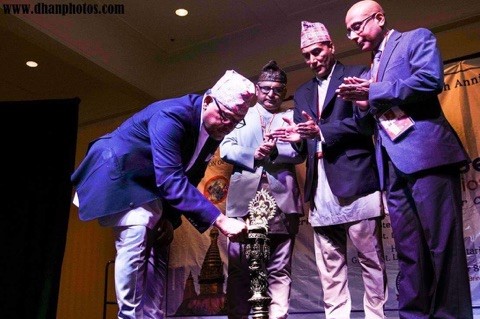
The twelfth Annual Joint Convention of the Association of Nepalese in Midwest America (ANMA) and the Nepalese Association of Southeast America (NASeA) was held in St. Louis, MO at the Union Station – a Double Tree by Hilton Hotel from September 2-4, 2016. The Greater St. Louis Nepali Chautari (GSTLNC), was the gracious host of the Joint Convention. This convention also marked the 35th Convention for ANMA and 25th Anniversary of NASeA.
The conference welcomed over 600 attendees from across America, St. Louis Bhutanese Nepali community members as well as visitors from Nepal and various parts of the world. The theme of the convention was “Nepali American Community, Preserve Our Culture and Identity” and its conclusion marked yet another validation of the concept of ANMA and NASeA, regional organizations, collaborating with local Nepali organizations in these undertakings and rendering Conventions into sought-after events by host cities in the presence of Nepali-Americans.
The formal opening Ceremony was on September 4th and featured Convention Chair, GSTLNC President Mr. Balram Panthi, NASeA President Mr. Bimal Nepal, ANMA President Mr. Sushil Raj Sharma, Chief Guest H.E. Ambassador Dr. Arjun Kumar Karki, Embassy of Nepal, and Member of Parliament of Nepal Mr. Ambar Bahadur Thapa as well as leaders and representatives of various Nepali and American organizations.
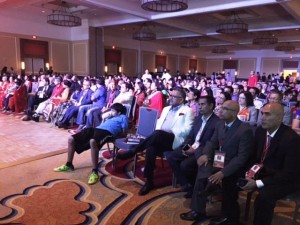
H.E. Ambassador Dr. Karki officially inaugurated the convention following the traditional lightening of the deep in Panash.
H.E. extending his remarks during the convention, highlighted various task the Nepal Embassy has performed in the past and extended special thanks to all Nepali organizations, individuals and US nationals for providing financial support to collect fund for the catastrophic earthquake that struck Nepal in 2015. He informed that the Nepal Embassy to US has posted all the details of the pledged donation in the website. Furthermore, he added the US Embassy Task team during the convention is a perfect example for our extended services to outreach the non-resident Nepalis in US along with new mobile technology for MRP. He thanked ANMA, NASeA and GSTLNC leadership for requesting to bring Embassy services at your doorsteps and expressed that our Nepali community will benefit from this facility.
Convention Chair Mr. Panthi on behalf of the joint convention, welcomed the chief guest and all distinguished participants and expressed that this convention will keep the spirit of ANMA-NASeA joint convention to a different height.
ANMA President, Sharma highlighted some of the activities that ANMA was engaged during his tenure such as “Ek EkPaila”. Ek Ek Paila is an initiative by Dr. Suman Thapa, professor at the Tilganga Institute of Ophthalmology, and an acclaimed singer and songwriter from Nepal, for treating patients of remote areas of Nepal. He also thanked the core committee members, the coordinators and the residents of Greater St. Louis for their dedication, perseverance and hard work in making the convention a grand success.
NASeA President Mr. Nepal while welcoming the participants, highlighted the 12 years of togetherness in organizing the joint convention which has reinforced NASeA/ANMA joint commitment in best serving Nepali American community in this region and beyond. Furthermore, he invited everyone to be the part of NASeA Silver Jubilee 2016 special event organized during Dashain festival in Atlanta, GA on Saturday, October 8, 2016.
Various other dignitaries and representatives wished success to the Annual Joint Convention and praised for continued partnership of two organizations. Some of the representatives include Mr. Padam Biswokarma – President of ILNS, Mr. Nima Sherpa – Vice-President of BDA, Ms. Natasha Wozniak – Director of Funds for Lumjung, Mr. T. B. Karki – advisor of NRNA and Mr. Ron Sitoula – Vice Mayor of Town of Indian Head.
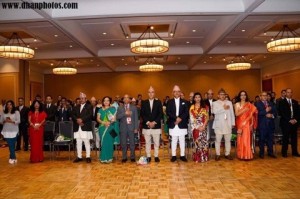
During the ceremony, ANMA and NASeA jointly awarded the token of appreciation to American citizen, Natasha Wozniak, who had a big heart to Nepal and Nepali people. Natasha is the Director of Funds for Lamjung and is leading the effort to rebuild Gurug village in Rainaskot, Lamjung.
A token of appreciation was awarded to Mr. Surya Thapa – Managing Director of White Himal for his continued support to ANMA and NASeA joint convention as a media partner.
ANMA General Secretary Mr. Bharat Kandel along with NASeA General Secretary Shiva Bista and GSTLNC General Secretary Dilip Yogi conducted the Opening Ceremony. The culture program was conducted by MC Surya Thapa from White Himal TV and Sunita Gurung, a beauty pagent from Bhutanese Nepalese community in St. Louis.
Plenary and concurrent sessions commenced Saturday morning, and continued on into Sunday evening. Some were focused on Nepali heritage and language, like literary and poetry workshops and the cultural programs. Others dealt with the socio-economic transformation of Nepal such as the presentation on “Empowering Children in Nepal to Reach Their Potentials”, “Rebuilding Rainaskot” and “Changing Banking Industry and its importance in daily life”. Community needs and interests were addressed in sessions like “Health and Wellness, Youth Feud, Information Technology, Mobile Development, and Mobile Games, How to Raise Happy Children & Cultural Differences in Parenting and Women’s Empowerment and Domestic Violence. Most of the panels and forums were well attended.
“NASeA Services towards community 25 Years and beyond,” a special Forum was organized, in order to mark NASeA’s Silver Jubilee. Health Camp, Blood Donations, Talent show, Dharma session and children activities along with Volleyball and football were the main attractions of the Joint Convention.
The Tour Office setup by the Embassy of Nepal to help expedite visa and MRP along with other legal services was the first in the history of Joint Convention as well as the first in the history of Embassy.
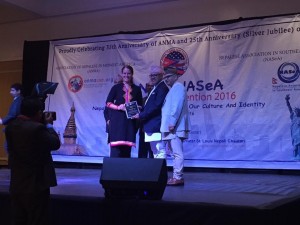
The annual general meetings of ANMA and NASeA were also held along with reunion of various alumni organization such as Budhanilkantha School (SEBS). Biannual election of the ANMA executive was conducted with Mr. Bala Ghimire being announced as the new incoming President. Five members of ANMA board of trustees was also announced at the event.
Concert by renowned band of Nepal 1974AD on Saturday and cultural program on Sunday was open to unregistered participants and they swelled attendance considerably. The programs were replete with professional-quality performances from local amateurs.
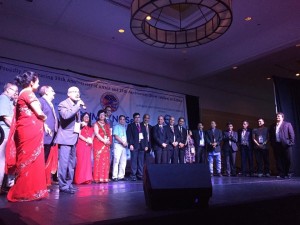
Keeping the tradition alive, NASeA/ANMA joint convention 2017 host organization city was officially announced by NASeA during culture program on Sunday. The host organization for the 13th Annual Joint Convention 2017 will be Greater Charlotte Nepalese Association (GCNA) of Charlotte, NC. The local representative of the host organization together with NASeA members invited all to participate to the 2017 convention in Charlotte, NC.
A big thank you goes to the Convention Chair and the President of the host organization Greater St. Louis Nepali Chautari (GSTLNC) Mr. Balram Panthi together with joint convention Co-Chairs and all the Coordinators along with members of GSTLNC and Nepali and Bhutanese communities of Greater city of St. Louis.
Last but not the least our special thank you goes to all media online or paper based, and TV journalists for their wide coverage of the joint convention news in US and around the world.
Sincerely,
ANMA-NASeA-GSTLNC Joint Convention Secretariat
Bharat Kandel, General Secretary -ANMA
Shiva Bista, General Secretary- NASeA
Dilip Yogi, General Secretary/ GSTLNC
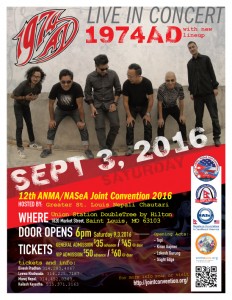
Come one, Come two and Come all…..
Please Register & Book your hotel today and kindly Help us Plan better!
12th ANMA/NASeA Joint Convention 2016
St. Louis, Missouri, September (02–04, 2016)
Please click the link below and register today
http://jointconvention.org/registration/#!/Events-Registration/c/17761217
Please click the link below and book your hotel today
http://doubletree.hilton.com/en/dt/groups/personalized/S/STLUSDT-ANM-20160902/index.jhtml?WT.mc_id=POG
For program details please visit:
http://jointconvention.org/wp-content/uploads/2016/08/Program-Committe-Final-Program-List.pdf
Nepali Embassy at our doorsteps:
http://www.nepalembassyusa.org/wp-content/uploads/2016/08/MRP-CONSULAR-SERVICE-NOTICE.pdf
Respected Editors Online/TV/Print Media in USA and around the globe,
Greetings from St. Louis, Missouri!
On behalf of the 12th Annual Joint Convention 2016 of Association of Nepalese in Midwest America (ANMA) and Nepalese Association in Southeast America (NASeA), together with the host organizations Greater St. Louis Nepali Chautari (GSTLNC) and the entire Joint Convention Organization Committee we invite you all to this historical joint Convention 2016 to be held during Labor Day weekend i.e. September 02-04, 2016in the great city of St. Louis, Missouri.
HE Dr. Arjun Karki, the Nepali Ambassador to the US and Nepali Government officials traveling from Nepal and many members of the Nepali diaspora from across the US and the world will attend the event. They will participate in a wide range of panels on important issues including, promoting Nepali culture in USA, immigration, information sharing in the field of business, healthcare, technology, and leadership development targeted towards youth, women, children etc.
We are glad to announce that upon the joint convention secretariat request the Embassy of Nepal in Washington, DC for the first time in our convention is planning to set up tour office at the 12th ANMA/NASeA joint convention venue in St. Louis, MO from Sept. 02-04, 2016.
The tour office will provide its services to people who need Power of Attorney, Travel Document, MRP, Visa and other consular services. The tour office will be setup at the 12th ANMA/NASeA joint convention venue at the Union Station Hotel. For details please check the link: http://www.nepalembassyusa.org/wp-content/uploads/2016/08/MRP-CONSULAR-SERVICE-NOTICE.pdf
Furthermore, we have already sent an invitation to the State Governor Honorable Jay Nixon, County and City officials of St. Louis, Missouri. We are also inviting other non-Nepalese Organizations Presidents together with Asian Americans and Pacific Islanders leaders and community members
This year, we have dedicated this convention to the Nepali American Community.
Our convention’s theme is:
“Nepali American Community, Preserve our Culture and Identity”
Please visit our website www.jointconvention.org and participate in various activities of your choice.
Please click the link below and register today
http://jointconvention.org/registration/#!/Events-Registration/c/17761217
Please click the link below and book your hotel today
http://doubletree.hilton.com/en/dt/groups/personalized/S/STLUSDT-ANM-20160902/index.jhtml?WT.mc_id=POG
For program details please visit:
http://jointconvention.org/wp-content/uploads/2016/08/Program-Committe-Final-Program-List.pdf
Nepali Embassy at our doorsteps:
http://www.nepalembassyusa.org/wp-content/uploads/2016/08/MRP-CONSULAR-SERVICE-NOTICE.pdf
With this note, we request all media personal to participate ANMA-NASeA joint convention and enjoy the rich culture, tradition and the identity of Nepali American community here in US. We also would like to request you to cover the news of our convention through your respective media.
For media coverage details please be advised to call our Joint convention Secretariat team member/NASeA General Secretary/Journalist Shiva Bista at (443) 927-6456
We (ANMA/NASeA/GSTLNC) jointly welcome you all and together please help us make our joint convention 2016 a Grand success!
With respect,
Balram Panthi, Chair Joint Convention
Sushil R Sharma, President, ANMA
Bimal Nepal, President NASeA
12thth Annual ANMA/NASeA Joint Convention 2016, St. Louis, MO
Email: panthi4@yahoo.com Phone: 314-276-3868
http://www.jointconvention.org/
– See more at: http://enepalese.com/2016/08/92853.html#sthash.Iw6wWF9R.dpuf
|
Follow us on Facebook

|

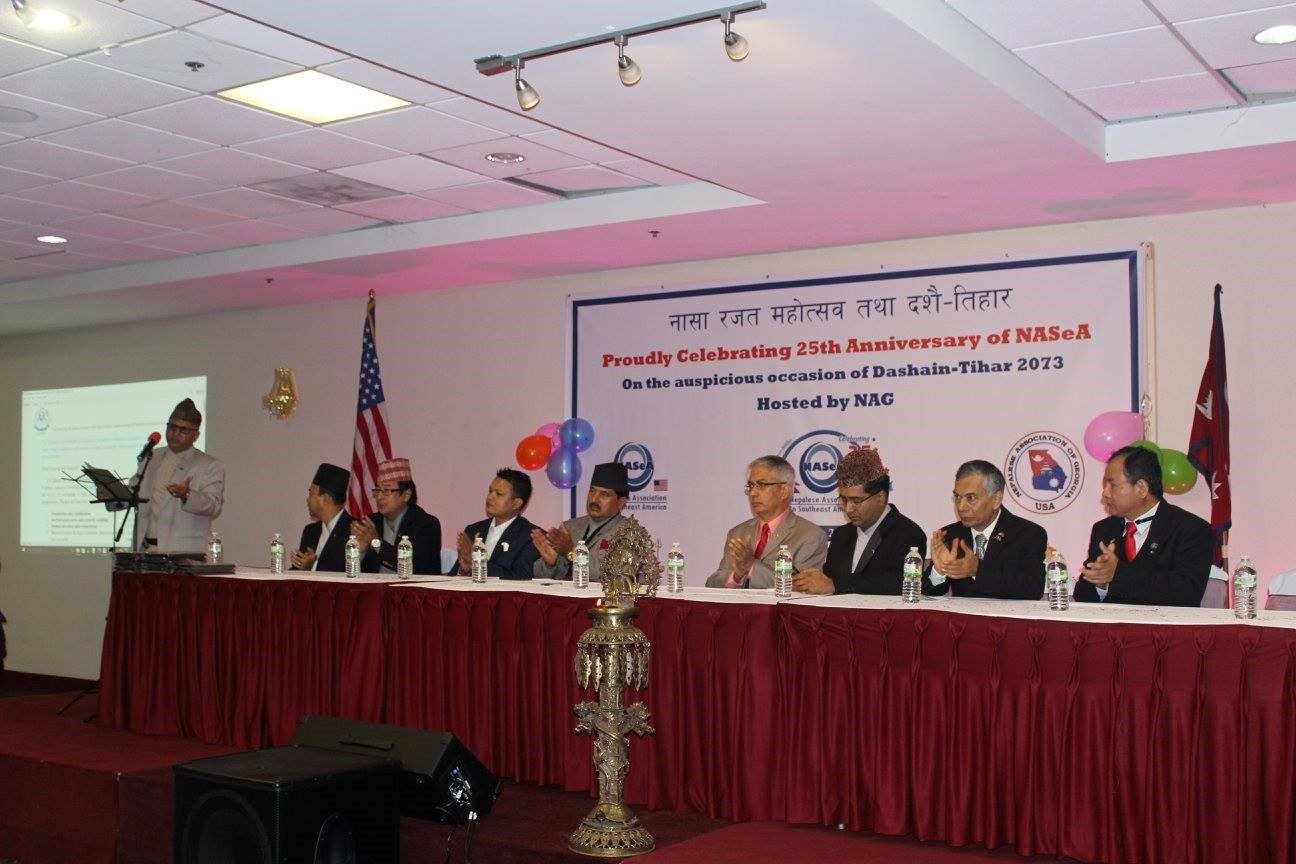


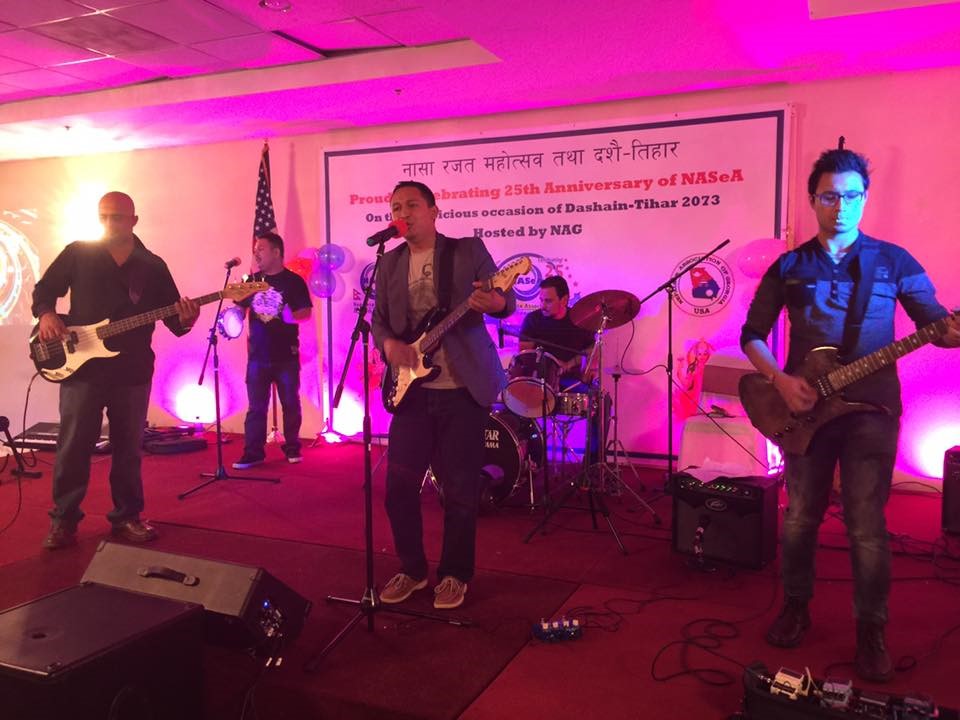
 few months back.
few months back. nquet hall inside Global Mall at the heart of beautiful city of Norcross in Georgia. Board members Bidya Gurung and Namita Ghimire led the decoration of the venue.
nquet hall inside Global Mall at the heart of beautiful city of Norcross in Georgia. Board members Bidya Gurung and Namita Ghimire led the decoration of the venue.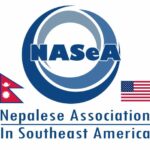

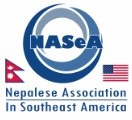










 Click here to become a member
Click here to become a member